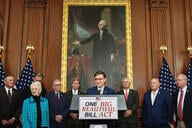You have /5 articles left.
Sign up for a free account or log in.
The Obama administration’s plan to open up Pell Grants to some incarcerated students, which will be announced formally on Friday, is already drawing criticism from some Republicans.
The U.S. Department of Education said Tuesday that the “limited pilot program” will operate under the experimental sites initiative, which allows the department to waive certain rules that govern federal financial aid.
Some Republicans on Capitol Hill are pushing back on the administration’s plan by questioning the department’s authority to start the pilot program, since the U.S. Congress explicitly cut most prisoners’ eligibility for Pell Grants in the mid-1990s.
Representative John Kline, the Minnesota Republican who chairs the U.S. House education committee, said he was open to discussing “whether this aid can help incarcerated individuals become productive members of society.”
But the White House “has chosen once again to stifle an important debate by acting unilaterally and without regard for the law,” he said in a written statement.
A department official, however, said in an email that the "administration believes equipping incarcerated individuals with the skills they need to successfully re-enter the community is one of the most powerful and cost-effective methods to ensure they avoid future contact with the justice system and become productive members of society."
The Obama administration has been considering the move since at least 2013, when it solicited proposals on experiments in federal student aid programs. The Education Department has the power under the Higher Education Act to temporarily waive certain requirements that typically govern federal financial aid.
Officials already have approved a range of experiments under that authority relating to competency-based education and other educational programs that measure success based on students’ ability to pass assessments rather than the time they spend in class. The department also previously signed off on waivers for colleges that wanted the ability to restrict students’ federal loan borrowing as a way to reduce student loan debt.
The experiments are intended to try out alternative ways to distribute federal loans and grants.
It’s not clear how, exactly, the department plans to structure the experiment for allowing some prisoners at federal and state facilities to receive Pell Grants to attend college programs. A department official on Tuesday would only describe the experiment as a “limited pilot program.”
However, summaries of the various experimental sites proposals the department received, which were obtained by Inside Higher Ed under the Freedom of Information Act, shed some light on how the administration may structure the experiment.
The proposals, some of which were submitted by advocates for prison education programs, lay out various ways the administration may craft an experiment designed to test the efficacy of Pell Grants in prisons. For example, one of the recommendations to the department was to create an experiment with a control group and a group receiving the Pell Grants so as to be able to compare more directly the effect of the new funding on the incarcerated students' outcomes.




